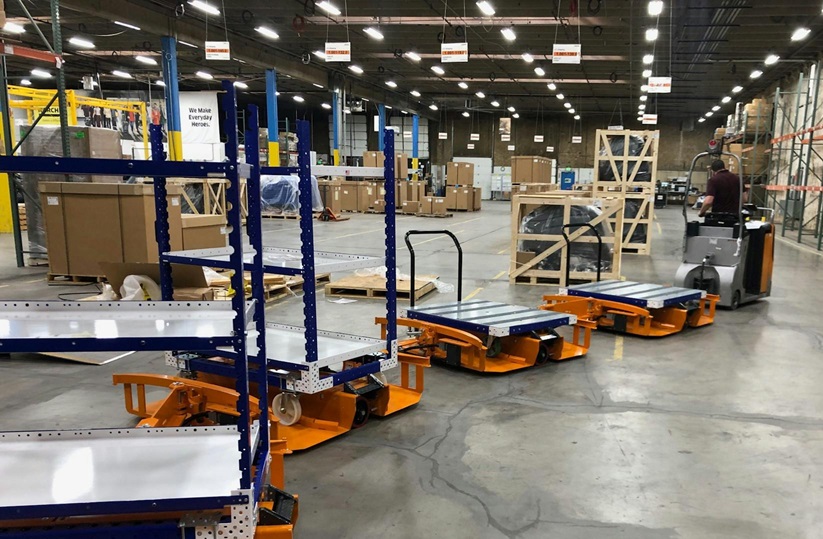Benefits of Customization for Operations
Customized utility carts are designed to meet the specific needs of a company’s operations, making them essential for enhancing workflow and boosting workplace efficiency. Unlike off-the-shelf models, these carts are carefully created, considering the specific tasks, load requirements, and environmental conditions they will encounter. It makes them a seamless addition to a business’s operational framework. Customization ensures that each cart is meticulously tailored, from the choice of material to the incorporation of functional features like adjustable shelves or secure drawers. This makes them invaluable assets for material handling and task completion within various industries.
Exploring the Link Between Custom Carts and Productivity
Increased productivity in the workplace can be achieved through the use of efficient tools that simplify and streamline processes. Custom material handling solutions are among these tools. They are carefully designed to ensure materials’ quick and secure transportation in various settings. Their unique design allows for seamless integration into existing workflows, improving the functionality of current systems and effectively addressing any gaps in material transportation. These bespoke solutions are crafted to meet precise requirements, enabling businesses to adjust their operations to the finest details. This customization can include the addition of specialized compartments, integrated locking mechanisms, and other unique features. As a result, they play a crucial role in reducing the time and effort dedicated to manual tasks, significantly boosting overall productivity.
Enhancements in Safety Through Custom Solutions
Incorporating custom utility carts into the workplace, including workstation, plays a crucial role in enhancing the safety culture within an organization. The design of these custom carts prioritizes ergonomic considerations, which are essential in reducing the risk of injuries related to poor posture and repetitive movements. Additionally, integrating safety features tailored to specific industry hazards—such as braking systems for sloped surfaces or cushioned edges to prevent impacts—is critical in preventing workplace incidents. Beyond adhering to initial safety standards, these carts, including workstations, are often designed with feedback mechanisms. This approach allows for adaptability and revisions based on real-world usage, ensuring that safety keeps pace with the evolving dynamics of the workplace and emerging risks.
Balancing Cost and Efficiency with Custom Carts
A thorough appraisal of cost-efficiency must consider more than immediate expenses; it should factor in the long-term operational gains custom utility carts are poised to offer. Although the initial cost of custom carts can be substantial compared to standard options, the value they deliver can far outweigh this upfront investment through their contribution to workflow fluidity, versatility in usage, and reduction in labor costs. Furthermore, an aspect not to be overlooked is the decline in workplace injury rates owing to the ergonomic design of these carts, which can lead to substantial savings via decreased compensation claims and less downtime due to staff injury.
Sector-Specific Improvements through Custom Utility Carts
Adaptation to the distinct demands of various sectors is a hallmark of custom utility carts. They are especially crucial in industries where specific operational constraints dictate specialized equipment needs. For instance, in the healthcare industry, the emphasis may be placed on carts that facilitate the sterile movement and storage of medical supplies and instruments. Conversely, in industrial settings such as manufacturing, strength, and resilience take precedence to withstand the consistent handling of substantial material loads and the demands of high-use environments.
Maintenance and Durability of Custom Utility CartsUnderstanding the importance of low-maintenance and durable utility carts is central to their value proposition. During the customization process, attention is given to selecting materials and components that can endure the rigors of everyday use, particularly in strenuous industrial conditions. High-quality components stand the test of time and ensure that maintenance routines are straightforward and infrequent, resulting in lower overall ownership costs. Furthermore, when the inevitable wear and tear require attention, replacing parts—rather than the entire unit—preserves the initial investment and minimizes operational disruption.
Innovation Driving the Future of Material Handling
The material handling landscape is ever-changing, and innovation is at the forefront of this transformation. The trend toward personalization in equipment is becoming increasingly evident, with new technologies enabling more specific and efficient designs for custom utility carts. Advances in material science, for instance, allow for lighter and more robust carts than ever, and the integration of intelligent technology opens up possibilities for carts that can track inventory or facilitate automated processes. This progressive march of innovation promises an ongoing improvement in custom utility cart offerings. It portends a future where these carts foster adaptable and responsive business operations.
Selecting the Right Manufacturer for Custom Carts
Selecting a trustworthy and proficient manufacturer is essential in acquiring custom utility carts. It is imperative to partner with a company that combines an in-depth understanding of operational needs within various industries with the expertise to translate those needs into practical solutions. An ideal manufacturer will offer not only customizable features and durable materials but also a commitment to customer service, ensuring that the carts delivered are longitudinally suited to the tasks they are intended to perform and capable of adapting to changes in operational dynamics.





